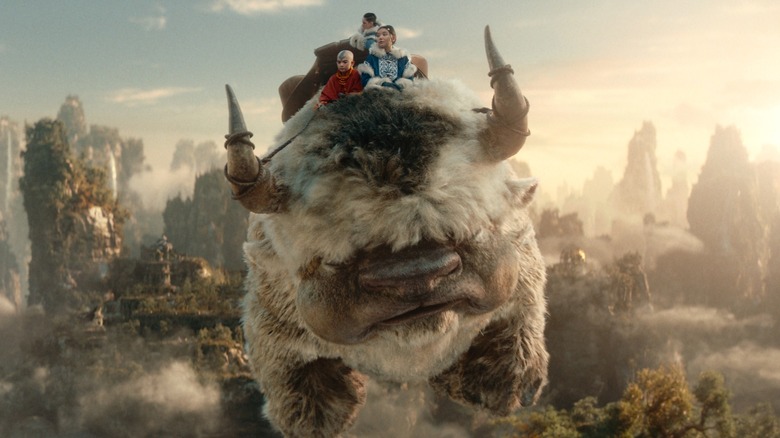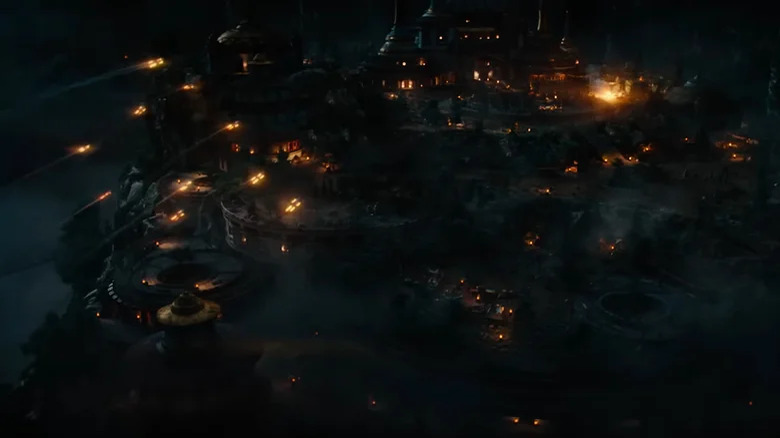New Avatar Live-Action Series Tells A Dark Story The Animated Series Never Could
"Avatar: The Last Airbender" has a perfect pilot; even just the first half of the two-part premiere episode does an excellent job bringing viewers into the show's Asian-inspired fantasy world, a place where people can bend the four elements. The first episode also does a phenomenal job of setting up the series' story (a 12-year-old kid has to save the world), the personal stakes (the main character is the last of his nation), the larger state of the world (a 100-year-old war), the tone (fun! Silliness! Some rather dark moments!), the deeper lore (bending, spirits, past lives), and, perhaps most importantly of all, the main characters.
Most of all, it does this without literally showing the events that kickstarted the war and made Aang the titular last Airbender. In the original series, we hear in the first episode that the Air Nomads haven't been seen in the 100 years since the Fire Nation attacked. While it's easy to imagine what happened, we don't actually see it. We only see Aang discover the remains of his people when he visits the Southern Air Temple and discovers it's populated only by skeletons. It's not just that a kids' show probably couldn't get away with showing a genocide on screen, but "The Last Airbender" lets the audience properly discover the truth with Aang himself. It doesn't matter that we don't see an entire people die in a brutal attack; what matters is the look on Aang's face when he realizes everyone he once knew and loved is dead and that his culture has been destroyed. (There's a reason why George Lucas didn't show Anakin slaughtering the younglings.)
Well, forget about that emotionally damaging nuance, because Netflix's live-action "Avatar: The Last Airbender" remake series will give the people the genocide they (maybe?) always wanted.
When the Fire Nation attacked
As I noted during my breakdown of the first trailer for Netflix's "Avatar: The Last Airbender," the show seems to be including the Fire Nation attack on the Air Nomads — the event that sets the whole story in motion. Speaking with IGN, showrunner Albert Kim opened up about including this pivotal — and previously unseen — scene. "I've talked a lot about how one of the reasons for doing this adaptation is to fill in the gaps," Kim explained. "And this, to me, was one of the big gaps in the original series."
"It was very important that we needed to see the event," he added. "We get to portray that and show exactly the horrors that start here and then have lasting repercussions for the next century of the world."
That seems to be the key to this change — the cascading wave of repercussions that stem from explicitly showing this in terms of tone. "This is something that wasn't in there that we want in our show because it is a different tone than the original series while we're trying to honor everything that was laid before us," added executive producer, director, and VFX supervisor Jabbar Raisani. By depicting the Air Nomad genocide, you automatically have a darker story and more present stakes for the characters and the world at large, as opposed to the relatively slow burn of the original series (which admittedly starts out as rather silly before maturing alongside the characters).
Kim also confirmed that the latest trailer features a character we don't see until much, much later — Fire Lord Sozin, who personally leads the attack on the Air Nomads for some reason. "We get to see Sozin here attacking Monk Gyatso. And it's a very important moment in the story. It kicks off the entire journey," Kim added.
The live-action "Avatar: The Last Airbender" begins streaming on Netflix on February 22, 2024.

